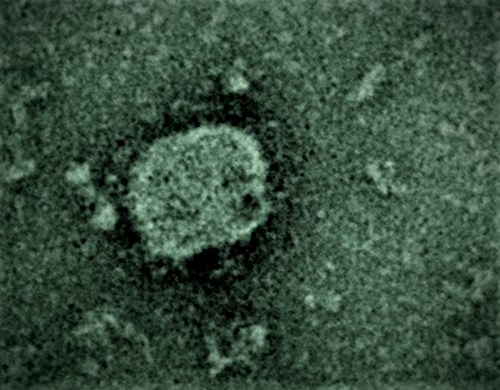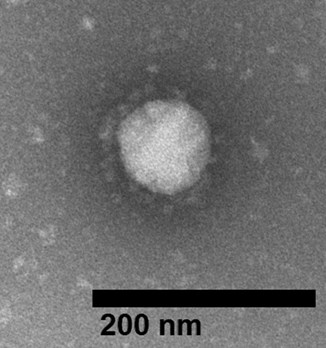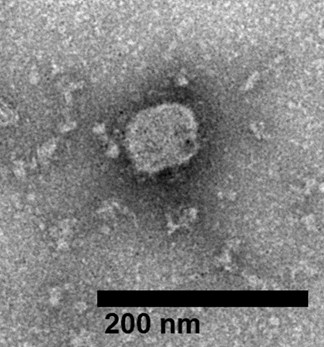Severe acute respiratory syndrome coronavirus 2 (SARS-CoV-2 England/02/2020 variant and SARS-CoV-2 Delta variant B.1.617.2/20I) batch release by NCPV

Severe acute respiratory syndrome-related coronavirus 2 (SARS-CoV-2), strain England/02/2020 (NCPV 2203181v), is the granddaughter bank of clinical isolate EPI_ISL_407073 (GISAID), isolated by Public Health England in January of 2020 in England. Falling under the PANGOLin lineage A, Nextstrain clade 19B, and clade S on GISAID, England-2 emerged at the start of the pandemic, imported from a visitor to Hubei Province, China (Lillie et al., 2020). Its amino acid change L84S in the non-structural protein 8 (NS8), encoded by open reading frame 8 (ORF8), established clade S on GISAID (GISAID, 2021) and is the defining difference from Wuhan-Hu-1 (GenBank accession number MN908947). This NCPV accession is particularly interesting as scientists can use it as a fully quality controlled reference for SARS-CoV-2 clade 19B from early in the pandemic.
The Delta variant (NCPV 2202111v) was registered as a variant of concern by the WHO in May of 2021 (WHO, 2021) and soon became the dominant variant in the UK and worldwide, replacing the Alpha variant (Hart et al., 2022). With several mutations, namely L452R, T478K and D614G amongst others, disease transmission was determined to be higher and the disease more severe than previous variants. Due to its higher virulence (Allen et al., 2022), incidence and hospitals admissions soared globally (Towhig et al., 2022). Delta proved particularly challenging for unvaccinated parts of the world population (Bian et al., 2021). Delta falls under PANGOLin lineage B.1.617.2 and Nextstrain clade 20I.
NCPV are delighted to make these SARS-CoV-2 England/02/2022 (NCPV 2203181v) and Delta variant B.1.167.2/20I (NCPV 2202111v) batches available to purchase from our website.


Transmission electron micrographs of SARS-CoV-2 England-2 (NCPV 2203181v) left and SARS-CoV-2 Delta (NCPV 2202111v) right.
Written by Teresa Ramalho, Jane Burton, and Ellie Drinkwater, September 2022
References:
Allen, H., Vusirikala, A., Flannagan, J., Twohig, K. A., Zaidi, A., Chudasama, D., Lamagni, T., Groves, N., Turner, C., Rawlinson, C. and Lopez-Bernal, J. (2022). Household transmission of COVID-19 cases associated with SARS-CoV-2 delta variant (B. 1.617. 2): national case-control study. The Lancet Regional Health-Europe, 12, 100252.
Bian, L., Gao, Q., Gao, F., Wang, Q., He, Q., Wu, X., Mao, Q., Xu, M. and Liang, Z. (2021). Impact of the Delta variant on vaccine efficacy and response strategies. Expert review of vaccines, 20(10), 1201-1209.
GISAID. (2021). Clade and lineage nomenclature aids in genomic epidemiology studies of active hCoV-19 viruses. Global Initiative on Sharing Avian Influenza Data. https://gisaid.org/resources/statements-clarifications/clade-and-lineage-nomenclature-aids-in-genomic-epidemiology-of-active-hcov-19-viruses/ Accessed 2022, September 06.
Hart, W. S., Miller, E., Andrews, N. J., Waight, P., Maini, P. K., Funk, S., and Thompson, R. N. (2022). Generation time of the alpha and delta SARS-CoV-2 variants: an epidemiological analysis. MedRxiv.
Lillie, P. J., Samson, A., Li, A., Adams, K., Capstick, R., Barlow, G. D., Easom, N., Hamilton, E., Moss, P. J., Evans, A., Ivan, M., PHE Incident Team, Taha, Y., Duncan, C. J. A., Schmid, M. L., and the Airborne HCID Network (2020). Novel coronavirus disease (Covid-19): the first two patients in the UK with person to person transmission. Journal of Infection, 80(5), 578-606.
Twohig, K. A., Nyberg, T., Zaidi, A., Thelwall, S., Sinnathamby, M. A., Aliabadi, S., Seaman, S.R., Harris, R.J., Hope, R., Lopez-Bernal, J., Gallagher, E., Charlett, A., De Angelis, D., Presanis, A., and Debrera, G. (2022). Hospital admission and emergency care attendance risk for SARS-CoV-2 delta (B. 1.617. 2) compared with alpha (B. 1.1. 7) variants of concern: a cohort study. The Lancet Infectious Diseases, 22(1), 35-42.
WHO. (2021). Weekly Epidemiological Update on COVID-19 – 11 May 2021. World Health Organization. https://www.who.int/publications/m/item/weekly-epidemiological-update-on-covid-19---11-may-2021 Accessed 2022, September 06.
